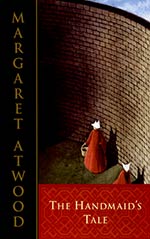
![]() niriop
niriop
1/21/2019
![]()
In the genre of dystopian fiction, if Huxley's Brave New World is part philosophical novel, part adventure story, and if Zamyatin's We is more-or-less straight satire, then The Handmaid's Tale sits with Orwell's Ninetten Eighty-Four as a psychological drama.
By the time you reach page 26, you realise that you are not just reading a dystopian novel, but a slave narrative. The world Atwood creates is immersive, and remains both insane and believably drawn. You genuinely feel Offred's fears and hopes as she relates her story. The prose is clear and crisp, if sometimes too introspective, causing the reader to get lost in tangential thoughts, but this doesn't happen too often.
What keeps the novel ever more relevant is not just its portrayal of an utterly totalitarian patriarchal society (a depiction of the "worst" that could possibly happen, what those toxic impulses and ideas could ultimately lead to), but its presentation of a society that is also white nationalist, with a political discourse based on fake news. The satire remains even more biting when it is ultimately revealed that not theocrats but sociobiologists were the true driving force behind the creation of Gilead--relevant in an era where the Alt-Right are trying to give their racism and sexism a "scientific" veneer.
You do get the feeling that Atwood lost a bit of patience at some points with her own narrative, and gave into big servings of pre-narrative back story (and in the "Historical Notes", post-narrative fill-ins). However, these segments do not over-power the main narrative, and do give useful information to the reader. There is perhaps maybe a little *too* much hope in the narrative for a dystopian story (we know Offred must live, and live in freedom of some description, because she is telling her own story uncensored); Winston Smith and John Savage both lost their minds, and the latter his life. But maybe I'm just being a miserable b******.